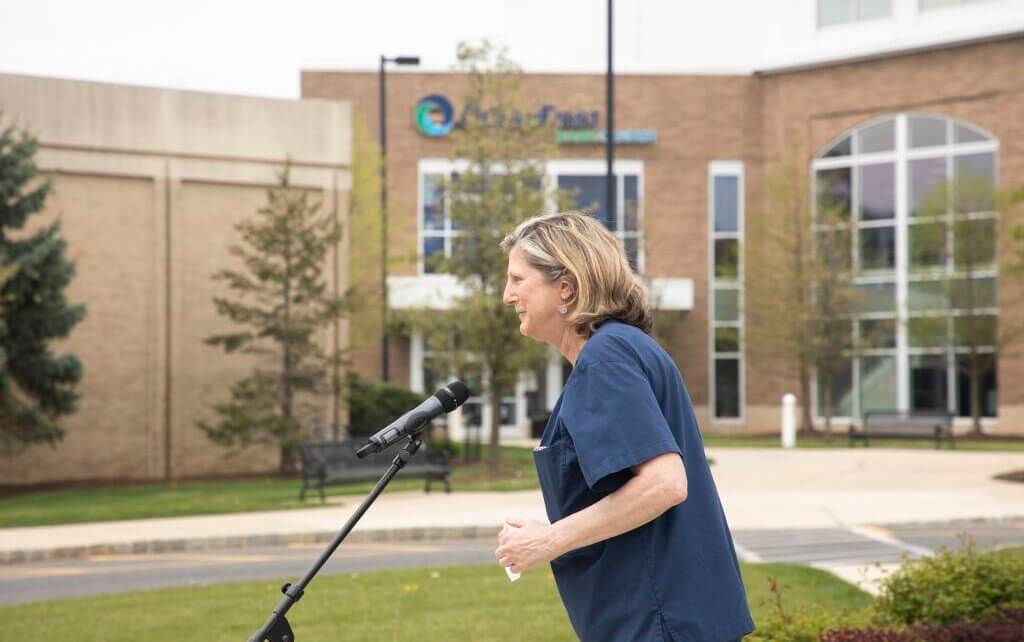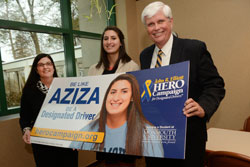Monmouth University announced an update to its COVID-19 vaccination protocol, stating that community members are no longer required to get the COVID-19 vaccine primary series or bivalent booster.
Effective at the start of the Summer 2023 semester, the change in protocol makes vaccination “highly recommend[ed]” rather than mandated. Other New Jersey colleges including Seton Hall University, Princeton University, Rowan University, Rider University, and the College of New Jersey have released similar statements changing their vaccine protocol to a recommendation instead of a mandate.
“I think we’ve said all along that we would monitor what’s happening on campus and what’s happening in the county and in the state, and we would watch what the CDC and the Department of Health are saying. We concluded that going forward, as we move out of the pandemic and toward a more endemic stage, the time has come for us to no longer require a vaccine but rather highly recommend it,” explained Mary Anne Nagy, Vice President for Student Life and Leadership Engagement. “No one likes to be mandated to do something. If you can help people understand the benefits of having it and not force them, then I think that’s the better approach.”
“We’re in a different place now with COVID than we were three years ago,” agreed Kathy Maloney, Director of Health Services. “We really have by all statistical purposes and trends moved into an endemic stage. COVID is still around, but it’s not in the numbers that it was. People are still hospitalized and dying, but not like they were.”
According to the Centers for Disease Control and Prevention (CDC), COVID-19 cases, hospitalizations, and deaths in Monmouth County are steadily declining. Based on the case rate, this area has been labeled as a low COVID-19 community level. Still, the CDC continues to recommend staying up-to-date with vaccines and avoiding contact with people who have COVID-19. Currently, vaccination is the leading prevention strategy.
Maloney explained that after three years of dealing with COVID, requiring the vaccine is no longer necessary to keep the University operational. Paired with the fact that Monmouth’s population is “predominantly healthy young adults” who don’t typically experience the more severe effects of COVID, she noted the need for a shift toward “personal choice.”
“We don’t do anything until we have an opportunity to get some feedback from people in the community,” clarified Nagy, describing the widespread support from student government leadership, the staff council, and the faculty council for changing the vaccine mandate to a recommendation.
“I feel like the University made the right choice,” said Breanna Guinta, junior English creative writing student, “Anything relating to our bodies should be up to us, not the school.”
“There is a reason why the number of infections has gone down so dramatically. There is merit behind mandating vaccines,” said a sophomore communication student. “It allowed for the spread of infection to slow dramatically, halting the effect of the virus, and allowing us to live a more normal life post-pandemic.”
“I hope there won’t be a large effect on the campus as a whole, but it might mean that students who aren’t getting the vaccines or boosters might have a worse course of COVID,” said Michael Phillips-Anderson, Ph.D., Associate Professor of Communication, who expressed concern about how much class time students might miss if they get sick.
“We’re coming up on this very interesting anniversary where you start to think about where we were three years ago,” said Nagy, describing the process of sending students home early for spring break in 2020 and not knowing what would happen in the following days, weeks, months, and years. “COVID is still out there, but so is the flu. We’ve learned to live with the flu, and that’s what we’re moving toward.”
Drawing further comparisons between COVID and the flu, Maloney predicted that there will be a shift toward annual COVID vaccination alongside flu shots. Although she hopes to still be able to run vaccination clinics in the fall, Maloney noted that emergency pandemic funding from the federal government is ending in May and might impact the process of distributing COVID-19 vaccines: “Vaccines will still be made available, but it will probably move toward what you see with the flu where you get your vaccination and it goes through your insurance with a copay.”
“I am of the belief that vaccinations help to reduce the spread of viruses and that it is important for members of our campus to have access. I believe that the University should continue to provide campus constituents with information and resources to access vaccinations even if the vaccines aren’t offered directly on campus,” said John Patro, OTD, OTR/L, Associate Professor and Chair of Occupational Therapy Department, who also noted the importance of basic hygienic practices like washing your hands to help prevent the spread of viruses.
“I am very proud of the University’s response to the challenges of the COVID-19 pandemic, and I am grateful to the Crisis Management Team for helping us navigate through these unprecedented times with great care and concern,” reflected Patrick Leahy, Ed.D., President of Monmouth University. “Safeguarding the health of our community has required each of us taking swift and preventive action to protect all of us, and I am grateful to our students, faculty, and staff for taking seriously their individual responsibility to keep our campus community healthy and safe.”
“I look back on what we’ve been through, and we went through hell. The whole country was in a dark, awful place,” said Maloney, describing past isolation, quarantine, and surveillance testing protocols. “It’s remarkable that we came through it. It was such a community effort to keep the University operational and to keep the educational process going. It was really a remarkable but exhausting feat.”



